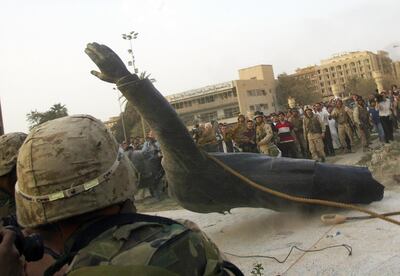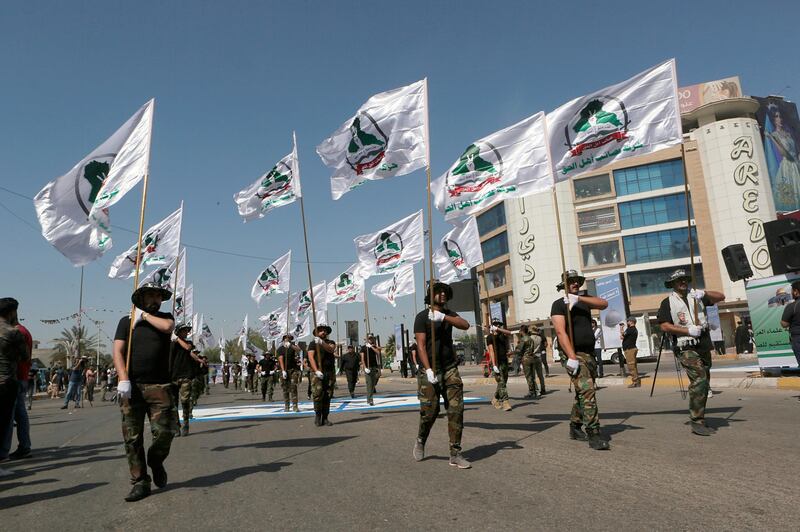On August 1, 1990, I was watching a VHS cassette recording of the movie Best Defence starring Eddie Murphy and Dudley Moore. It had been made nearly six years earlier, based on what seemed a flimsy plot in which Murphy, playing an American army officer, is stuck behind enemy lines after Iraq invades Kuwait. It is supposed to be a comedy – and you would be right in thinking it is as unfunny as it sounds. The day after I watched it, the world woke up to the news that Iraq had invaded Kuwait. What had seemed a bad joke had turned into a waking nightmare.
Another nightmare is brewing after fighters of Iran-backed paramilitary groups were killed in drone strikes near the border with Syria – the latest in a string of attacks blamed on Israel. This week, Iraq's government has pledged to go to the United Nations Security Council to defend its sovereignty.
On the surface, this would appear to be exactly the course that prime minister Adel Abdul Mahdi should take given what's at stake for the wider region. However, based on modern Iraq’s 87-year history, the major powers at the UN will do little or nothing to prevent another conflict breaking out in the country.
It would be a mistake not to immediately stabilise the current precarious situation in Iraq, recovering as it is from the destruction wrought by ISIS, grappling to bring under state control the many militias who helped defeat the terrorist group and only now beginning to establish some political stability under Mr Abdul Mahdi. As my colleague in Washington Joyce Karam wrote this week, the Trump administration in particular is walking a fine line in doing little to curb recent Israeli actions.
Right now, Iraq is at a tipping point, in danger of collapsing back into chaos and conflict. Such an outcome would be terrible for the region as a whole. There is, surely, enough self-interest at stake for major world powers to work to stop further instability in the Middle East. First and foremost on that list would be to prevent the regime in Tehran attempting to use war to its advantage, as it did after the US-led invasion of Iraq in 2003. Then, the warnings of how Iran might benefit from a power vacuum in Iraq were not acted upon effectively enough and the powder-keg situation we have now is a direct result of poor post-war policy. How effective would Washington's "maximum pressure" policy on Iran continue to be if turmoil in its neighbour allowed it to undermine sanctions against it and its proxies? Surely US military assets in Iraq would also become natural targets if a conflict were to ignite?

The 2003 conflict, for example, was the consequence, arguably, of the world playing down the true threat that dictator Saddam Hussein represented until his invasion of Kuwait made it a matter of urgency. Before then, the West mistakenly believed its self-interest was best served in supporting Hussein, no matter the cost to the people who were so oppressed by his regime that the mental and physical scars they carry have not yet fully healed. A strong Iraq can be an effective bulwark against Iran's efforts to destabilise the region but to believe that under a vicious regime it could sustainably remain so was a fiction of convenience kept up both by Hussein and world powers such as the US and UK. If Iraq repeatedly fails as a state, what role can it offer for broader stability? Countries such as the UAE and Saudi Arabia understand the need for a healthy Iraq and have worked to increase co-operation in areas such as security.
Policy by outside powers has rarely been as rational. Going back a century, the idea that a French presence in the region after the First World War would serve the interests of its fellow colonial power Britain ended up creating a manufactured status-quo (Sykes-Picot) that only led to more conflict. It also deprived Arabs of a real chance to govern themselves after the removal of the Ottomans.
Successive generations inside Iraq have struggled to establish a cohesive national identity that can supersede ideologies such as pan-Arab nationalism amid sectarian divisions that have only become more pronounced over time. There have been periods of hope, as skilled and educated Iraqis did their best to help build a modern, viable country, including economic, cultural and social advances. In the end, the efforts of these great men and women were undermined by circumstances beyond their control.
The erosion of the idea of Iraq began in earnest from the mid-1970s. Trust in government had already been crumbling after a series of successive failures and coups going back to the British mandate as Iraq became a pawn in the broader Cold War between the US and the Soviet Union. Saddam Hussein’s regime accelerated the process to the point that Iraq became a mafia state, corrupt and deadly with equal measure.

The West and the Soviets both supported Saddam at different times. His war against Iran in the 1980s was viewed as a useful vehicle to keep the dangerous regime in Tehran weak. Instead, it might actually have helped extremists in Iran solidify control, promoting a nationalistic and religious fervour to fight a foreign enemy.
There is of course the danger of over-simplifying events and it is all to easy to invoke hindsight (not to mention as annoying as the invocation of Sykes-Picot for the reason of all the region’s ills). However, there is no denying that many will correctly say they could see each crisis coming. For example, before the invasion of Kuwait, people living there could sense the Iraqis were close to acting against them. Hussein even signalled to Washington what he was about to attempt and received no censure.
In 2019, we have clear visibility of the very real risk of chaos unfolding in Iraq and the grim effect it might have on the population. There is a real opportunity for world powers to help prevent it from happening but time is running out, once again.
Mustafa Alrawi is an assistant editor-in-chief for The National. A British national of Iraqi descent, he helped launch the newspaper Iraq Today in 2003





